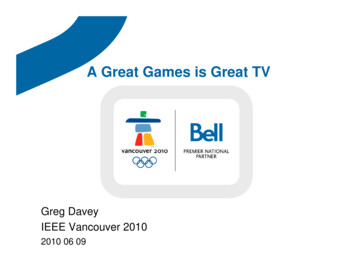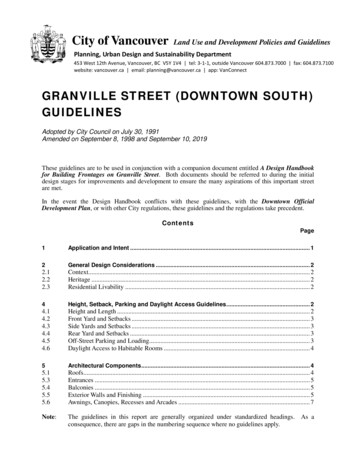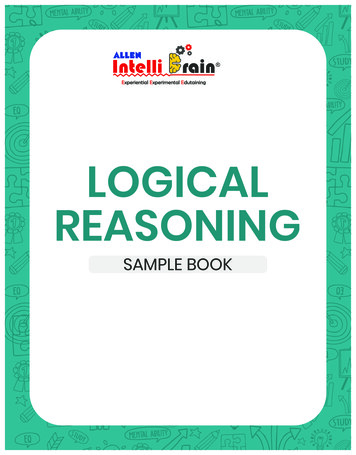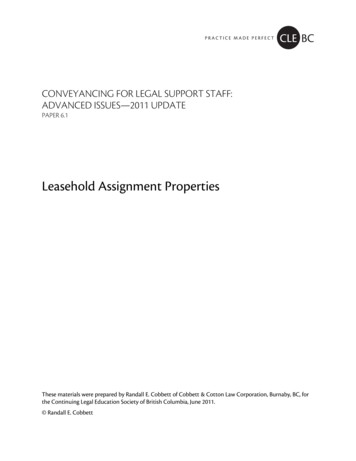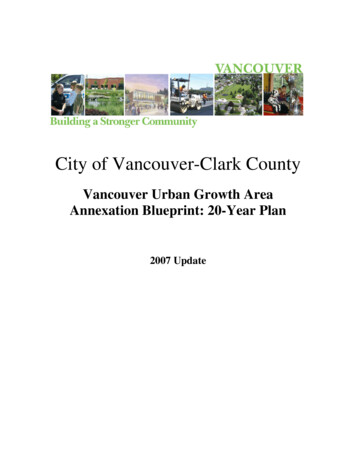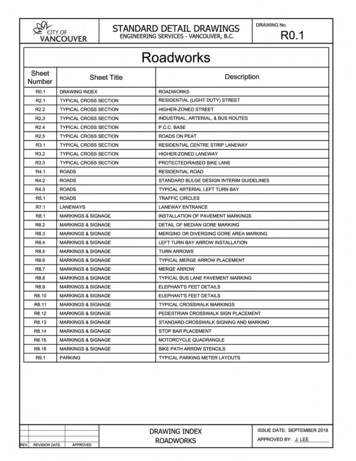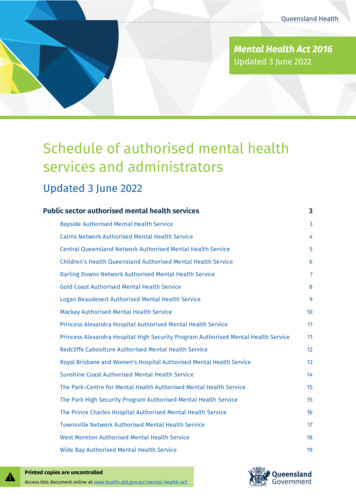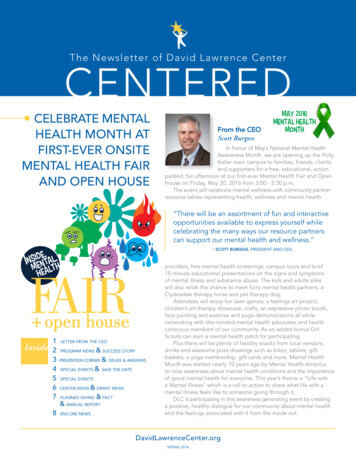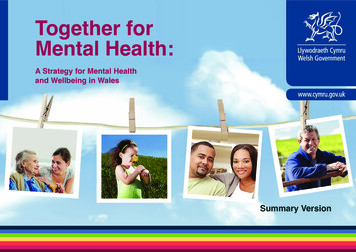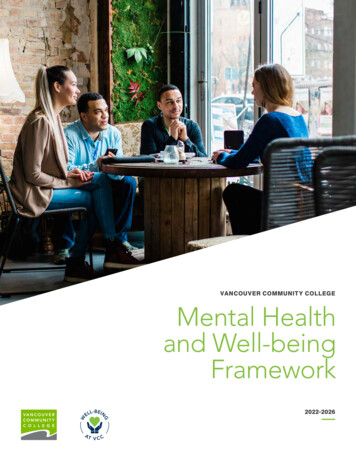
Transcription
vcc.caVA N C O U V E R C O M M U N IT Y C O LLE G EMental Healthand Well-beingFramework2022-2026
CONTENT SLand AcknowledgementMessage from the PresidentEndorsementExecutive SummaryOrientationIntentMissionCommitmentsOverall ApproachOrganizational SystemsWork and Learning EnvironmentCommunity ConnectednessEducational EndeavourSupport ServicesImplementationEvaluationAppendix: External Mental Health ResourcesContributing AuthorsSelected SourcesVC CM ENTA L HEA LT H A ND W EL L - B EI NG FRAM EWO RK3456789111213141516171819202426
L AND ACK NOWLEDGEMENTWe acknowledge that VancouverCommunity College is locatedon the traditional and uncededterritories of the xʷməθkʷəy̓ əm(Musqueam), Sḵwx̱ wú7mesh(Squamish), and səl̓ilw̓ ətaʔɬ(Tsleil-Waututh) peoples whohave been stewards of this landfrom time immemorial.VC CM ENTA L HEA LT H A ND W EL L - B EI NG F RAM EWO RK3
MESSAGE FROM THE PRESIDENTDear VCC community,For much of history, mental health has been tragically misunderstood, but I believeour growing knowledge, awareness, and compassion has great potential to save livesand strengthen communities. This Mental Health and Well-being Framework puts suchprogress into action at VCC.Supporting mental health and well-being is closely tied to VCC’s commitmentsto justice, equity, diversity, inclusion, and decolonization (JEDI-d), all of whichplay major roles in our long-term strategic plan for the college. VCC strives toinnovate, engage, and excel for years to come, and this hinges on us caring forand supporting each other well.No-one is meant to endure mental-health challenges alone. Whether you have adiagnosed mental illness or an addiction, or are experiencing grief, depression, anxiety,burnout, or even “everyday stress,” you deserve to find help easily and without stigma.Wholly and meaningfully supporting mental health and well-being at VCC will taketime, effort, systemic changes, and many conversations. However, I take heart in thefact that this framework is based on quality research and customized to our uniqueVCC community.I applaud VCC’s Mental Health and Well-being Steering Committee and therepresentatives from SUVCC, CUPE and the FA for their timely and thoughtful work onthis project, as well as the community members who offered over 1,500 responses tosurveys and dialogues.As we shape the future of VCC together, I urge you all to join me in continuing to learnabout mental health and building a community that leaves no-one behind.Sincerely,Ajay PatelPresident and CEOVancouver Community CollegeVC CM ENTA L HEA LT H A ND W EL L - B EI NG FRAM EWO RK4
ENDOR SEMENTDear VCC community,This framework represents such an important milestone on VCC’s ongoing journey tocreate community conditions deeply conducive to mental health and well-being.From the outset, the framework is articulated in specific and careful ways designed toset the intent and mission underpinning a collective vision of VCC as a mentally healthycommunity. Each of these elements were co-developed in partnership with the VCCcommunity members, helping to ensure that the framework is as responsive as possibleto the community it intends to serve.Each of the commitments described in the framework, ranging from the overallapproach to consideration of support services, creates such a strong opportunity formeaningful movement towards a preferred vision of campus mental health at VancouverCommunity College.In keeping with foundational documents like the 2015 Okanagan Charter: Aninternational charter for health-promoting universities and colleges, this frameworkavoids over-emphasizing distressed individual community members as the only site forintervention. Rather, the framework clearly articulates the imperative for mobilizingsystemic, environmental, and community-centred change all in service of mental healthfor all. This will help to ensure the most comprehensive of responses as the campusbreathes life into the framework.The Vancouver Community College Mental Health and Well-being Frameworkholds promise for a transformative approach to promoting individual and collectivecommunity mental health and well-being. The notions of influencing the conditions thataffect well-being, collaborating across boundaries and differences, and democratizingwho can assist when someone is in distress all inspire a new starting place for such animportant endeavour.Congratulations to the VCC Community and everyone who helped contribute to thisimportant document! The implementation of the intent, mission, and commitments ofthis framework will generate momentum and change and I’m looking forward to hearingmore as your efforts progress.Jonny MorrisChief Executive OfficerCanadian Mental Health Association BC DivisionVC CM ENTA L HEA LT H A ND W EL L - B EI NG FRAM EWO RK5
E XECUTIVE SUMMARYThe need for post-secondary institutions like ours to cultivate an environment thatsupports mental health and well-being has already been recognized for decades.Research has emphasized the value of a campus community that is purposeful, open,just, disciplined, caring and celebrative.This Mental Health and Well-being Framework is meant to guide Vancouver CommunityCollege’s (VCC) efforts in promoting mental health for the next five years (2022-2026).It was guided by VCC’s Mental Health and Well-being Steering Committee, whosemembers were brought together from across the college.This framework is the result of an extensive consultation process and website audit,involving focus groups, community dialogues, and a campus-wide survey thatengaged a wide range of VCC students and employees, including staff, faculty, andadministrators (“our community”).This framework was informed by the needs and priorities of the VCC community alongwith sound theory and recognized best practices in campus mental health. Over thenext five years, VCC’s Mental Health and Well-being Steering Committee will lead us inimplementing this framework and monitoring VCC’s progress.Through the consultation process, six commitments emerged in our ongoing questto be a mentally healthy community. Each of our commitments involves a number ofcomplementary ideals to which we aspire across our college.VC CM ENTA L HEA LT H A ND W EL L - B EI NG FRAM EWO RK6
OR IENTATIONThroughout this framework, we refer to health, mental health, and well-being. We understandthese key concepts in a more affirmative, appreciative, and inclusive sense than is often foundin common use.Health is holistic and inclusive well-being (physical, mental, social, cultural, spiritual,ecological, economic) that is much more than the absence of illness or injury. Health appliesboth to individuals and the wider communities they comprise.Mental health involves thriving rather than just surviving, flourishing instead oflanguishing, whether mental illness is present or not. As mentally healthy individuals,we are able to exercise our capacities, deal with life’s pressures, function in a productiveway, and benefit our communities. As a mentally healthy community, we will build and drawon our collective capacity, respond positively to the challenges and opportunities of publiclife, work collaboratively toward productive outcomes, and promote dignity and equityamong our members.Promoting mental health is about helping individuals and communities to bettermanage mental health and the factors that influence it. For us at VCC, this means fosteringpersonal resilience among our members and shaping a natural and social environment thatis favorable for everyone. Our efforts will attach high value to personal agency, wholesomerelationships, diverse cultures, equal opportunities, and fairness. Accordingly, ourpromotion of mental health at VCC will: involve equipping our community members to influence the conditions that affect ourwell-being (including our structures and systems) rather than simply trying to functionunder such conditions; be a shared collaborative endeavour with our respective roles and expertisecomplementing each other rather than engaging in fragmented and competing efforts; involve adopting initiatives through a participatory, consensus-based process that elicitsinvested ownership rather than constrained decision-making and adherence; prompt us to assist one another in a routine way rather than viewing care as a duty onlyfor professionals who provide specialized help; lead us, in situations where further assistance is needed, to enable each other to betterattend to our own health and advance our shared well-being.VC CM ENTA L HEA LT H A ND W EL L - B EI NG F RAM EWO RK7
INTENTTo identify what a mentally healthy campus communitylooks like for VCC and to inspire us in collective pursuitof this visionThe consultation process for this Mental Health and Well-being Framework made itclear that VCC members want to see our community enjoy mental health through aculture marked by: understanding, kindness, and compassion; strong connectedness and mutual support; regard for personal agency, diversity, and social justice.The Commitments section of the framework further describes this vision. The needfor higher education to contribute to enhancing the health of citizens and communitiesis also recognized by the 2015 Okanagan Charter: an international charter forhealth-promoting universities and colleges. Promoting well-being within the collegecommunity not only helps our students complete their programs and earn credentials,but it also equips students and employees to improve lives beyond our campuses and isinherent in VCC’s focus on experiential learning.VC CM ENTA L HEA LT H A ND W EL L - B EI NG F RAM EWO RK8
MISSIONTo help our learning community think, speak, and act inappropriate and constructive ways regarding mental healthThe consultation process for this Mental Health and Well-being Framework confirmedthat VCC members want to see our campus community promote mental health andwell-being by:Building capacity and enhancing literacyVC C Developing knowledge, skills, systems, and leadership to encourage cohesionon our mental health commitments Enhancing our infrastructure to support mental health projects and partnerships Empowering our members by elevating engagement, strengthening ourconnections, and utilizing our resources Extending our ability to understand and influence factors that impact ourindividual and collective well-beingM ENTA L HEA LT H A ND W EL L - B EI NG F RAM EWO RK9
Engaging in routine dialogue to foster empathy and normalize discourse Relating to each other as fellow humans through speaking but also trulylistening Leaving conversations with a better understanding and appreciation of others,their experiences, and the different perspectives that make up our community Building trust that enables us to deliberate and strive for consensus whilerespecting our differences and our interdependence Recognizing and acknowledging common vulnerabilities in order to fosterconsiderate discourse and shared responsibility for well-beingCollaborating, respecting difference, and working towards consensus Gratefully drawing on our rich social and cultural diversity to incorporatedifferent experiences, frames of reference, insights, and concerns Building bonds within and bridges across departments and schools to benefitfrom a wide range of interdisciplinary expertise and gain complementaryperspectives Cultivating a team spirit across our institution based on respect, competence,contribution, and accountability Providing exemplary leadership by modelling nurturing, transparentrelationships, sharing power, and offering supportThis mission recognizes that capacity building is not just a means to our goal of sharedmental health; it is an integral part of it. Dialogue calls us to practice empathy andencourages us to offer support. Fully representative participation helps build a caringcommunity whose members are assured we all matter and belong and are invested inboth receiving and giving support.“Health promotion requires a positive, proactive approach,moving ‘beyond a focus on individual behaviour towardsa wide range of social and environmental interventions‘that create and enhance health in settings, organizationsand systems, and address health determinants.”–2 015, OKANAGAN CHARTER: AN INTERNATIONAL CHARTER FOR HEALTH PROMOTINGUNIVERSITIES AND COLLEGESVC CM ENTA L HEA LT H A ND W EL L - B EI NG F RAM EWO RK10
COMMITMENT SThrough the consultation process, six commitments emerged in our ongoing quest tobe a mentally healthy community. These commitments pertain to several interrelatedaspects of our life and work at VCC.1. O verall ApproachWe seek to promote health (including mental health)with an overarching focus on well-being and relate to our community’s needs in aconsistent, holistic, integrated, proactive, and culturally attentive way.2. Organizational Systems We seek to have diverse perspectives on well-being(including mental health) shape our institutional structures and operational practices.3. Work and Learning Environment We seek to have well-being (includingmental health) influence our decisions around design and allocations of physicalspace as well as our provisions for work and leisure time.4. Community Connectedness We seek to strengthen positive relational andsocial connections among our members within and across departments and cultivatea culture of belonging, engagement, mutual support, and shared responsibility.5. Educational Endeavour We seek to develop well-being literacy (includingmental health) as an essential component of our educational mandate and equip ourstaff and students to make contributions to the health of the campus community andthe broader public.6. S upport Services We seek to provide our community with safe and culturallyresponsive mental health resources both routinely and in times of urgent need. Wealso seek to raise awareness of these resources and to make them as convenient,direct, encouraging, and restorative as possible.VC CM ENTA L HEA LT H A ND W EL L - B EI NG F RAM EWO RK11
OVERALL APPROACHWe seek to promote health (including mental health)with an overarching focus on well-being and relate to ourcommunity’s needs in a consistent, holistic, integrated,proactive, and culturally attentive way.VC C VCC appreciates that various dimensions of health (e.g., physical, mental,emotional, social, spiritual, ecological, economic) are intertwined and deserveequal respect and concurrent attention. VCC recognizes that individual and collective health are interdependent andthat improvement of one contributes to improvement of the other. VCC understands that health is related to various contextual factors andenvironmental influences that require improvement. VCC endeavors to enable our members to exercise agency, autonomy, andaccountability in working towards personal and shared well-being. VCC talks about mental health challenges in common and normalized waysand supports struggling members with the same regard as those with physicalhealth challenges.M ENTA L HEA LT H A ND W EL L - B EI NG F RAM EWO RK12
ORGANIZATIONAL SYSTEMSWe seek to have diverse perspectives on well-being(including mental health) shape our institutional structuresand operational practices. VCC expressly includes mental health and well-being in our vision, values,mission statements, work philosophy, personnel development, communicationpractices, and provision of services. VCC’s governance and administrative structures reflect our diverse community,demonstrate openness, uphold social justice and impartiality, and pursuedecolonization. VCC’s academic structures appreciate and celebrate our diversity, encourageinclusion, enable equity and respect, and incorporate indigenous ways ofknowing, teaching and learning. VCC’s operational practices embody principles of mutual respect andresponsibility. VCC’s policies ensure representation and are attentive to the impacts onminorities or disadvantaged groups. VCC honours the United Nations Declaration on the Rights of IndigenousPeoples (UNDRIP) and responds to the Truth and Reconciliation Commission’sCalls to Action addressing the historical exclusion of Indigenous people ineducation. VCC respects the United Nations Sustainable Development Goals and supportsaction to address climate change and its adverse impacts including harmfuleffects on mental health.“In essence, we should be preparing students for thework of the world, not just for the world of work.”– J. PORRITT, 2012. UNIVERSITIES MUST LEAD THE WAY ON THE SUSTAINABILITY AGENDAVC CM ENTA L HEA LT H A ND W EL L - B EI NG F RAM EWO RK13
WORK AND LEARNING ENVIRONMENTWe seek to have well-being (including mental health)influence our decisions around design and allocationsof physical space as well as our provisions for work andleisure time. VCC provides safe and attractive spaces in which to meet, relax, and engage inrecreational / leisure activity or gather for cultural purposes. VCC offers work and study spaces that support physical and mental health. VCC encourages and ensures meaningful breaks during the work or school day. VCC encourages and enables employees and students to adopt a healthywork-leisure balance.“If the frogs in a pond started behaving strangely,our first reaction would not be to punish them oreven to treat them. Instinctively, we'd wonderwhat was going on in the pond.”– DAN REIST, UNIVERSITY OF VICTORIAVC CM ENTA L HEA LT H A ND W EL L - B EI NG F RAM EWO RK14
COMMUNITY CONNECTEDNESSWe seek to strengthen positive relational and socialconnections among our members within and acrossdepartments and cultivate a culture of belonging,engagement, mutual support, and shared responsibility.VC C VCC fosters connectedness in a wide variety of formal and informal ways in theworkplace, classroom, and campus community. VCC promotes and practices dialogue that involves our members in decisionmaking and community building. VCC prioritizes clear, respectful communication by notifying our members ofdevelopments and opportunities, providing mechanisms for routine feedback,and responding promptly to inquiries and requests. VCC encourages meaningful, regular check-in sessions for our employees andstudents. VCC provides opportunities for community story-sharing and celebration. VCC seeks to emphasize “community” in its name, contributing to ourneighbourhoods by forming strong connections and partnerships with diversebodies including Indigenous groups/nations.M ENTA L HEA LT H A ND W EL L - B EI NG F RAM EWO RK15
EDUCATIONAL ENDEAVOURWe seek to develop well-being literacy (including mentalhealth) as an essential component of our educationalmandate and equip our staff and students to makecontributions to the health of the campus community andthe broader public. VCC incorporates well-being (including mental health) in our statements ofacademic goals and in our institutional learning objectives. VCC infuses well-being (including mental health) into curriculums acrossdisciplines, professional development programs, teaching and learningworkshops, course management, and assessment processes for staff andstudents. VCC takes a decolonizing perspective on collective health and well-beingand recognizes the meaning of our place on unceded traditional Indigenousterritory. VCC nurtures a sense of mutual responsibility for our ecosystem and caresabout its relation to mental health and well-being. VCC cultivates mental health literacy in our informal and casual conversations. VCC equips employees and students to navigate the challenges of postsecondary life, thereby decreasing mental health emergencies. VCC provides training opportunities for students and employees to developcultural appreciation and sensitivity, build communication skills, and learn teambuilding and conflict resolution techniques. VCC educates students and employees to recognize when individuals maybe signaling for help, how to inquire with sensitivity, and provide immediateassistance or refer them to further support.“Higher education has a unique opportunity andresponsibility to provide transformative education.”–2 015, OKANAGAN CHARTER: AN INTERNATIONAL CHARTER FOR HEALTH PROMOTINGUNIVERSITIES AND COLLEGESVC CM ENTA L HEA LT H A ND W EL L - B EI NG F RAM EWO RK16
SUPPORT SERVICESWe seek to provide our community with safe and culturallyresponsive mental health resources both routinely and intimes of urgent need. We also seek to raise awareness ofthese resources and to make them as convenient, direct,smooth, encouraging, and restorative as possible. VCC makes appropriate self-support resources clearly available in a variety ofways including a dedicated webpage with helpful links and other awarenessmaterials and campaigns. VCC strives to make professional trauma informed counselling services promptlyand readily accessible to our students and employees. VCC provides our students and employees with caring mental health assistanceand accommodations to support them to remain on or return to campus, as partof our Academic Policies and Collective Agreements. VCC encourages and facilitates access to more intensive and culturally sensitivemental health care and services for our community members.“Health is created and lived by people within thesettings of their everyday life; where they learn, work,play and love.”– WHO, 1986. OTTAWA CHARTER FOR HEALTH PROMOTIONVC CM ENTA L HEA LT H A ND W EL L - B EI NG F RAM EWO RK17
IMPLEMENTATIONActivating the Mental Health and Well-being Framework will take planning andimplementation efforts on the part of the entire college community. While this is ashared responsibility, our Mental Health and Well-being Steering Committee will takea principal role in driving and supporting these efforts by working collaboratively withdepartments and existing committees throughout the college. The Steering Committeewill also direct its focus towards: establishing new working groups that will set specific objectives to ensureprogress; strengthening communication and integration with other key college-wideplanning initiatives (e.g., Indigenization, EDI, Campus Master Plan) in ways thatemphasis collective and coordinated action.Promoting mental health is “the process of enhancingthe capacities of individuals and communities to takecontrol over their lives and improve their mentalhealth. Mental health promotion uses strategiesthat foster supportive environments and individualresilience, while showing respect for culture, equity,social justice, interconnections and personal dignity.”– JOUBERT & RAEBURN, 1998VC CM ENTA L HEA LT H A ND W EL L - B EI NG F RAM EWO RK18
EVALUATIONIt is critically important for us to assess the impact and value of this framework andits implementation in ways appropriate for the health promotion endeavour it is. Thismeans checking for progress in fulfilling our mission and in meeting our declaredcommitments. It involves monitoring processes for consistent application of theframework’s values and principles in our everyday practice at VCC. It will require our useof both quantitative and qualitative methods to provide various measures of activationand influence. Our assessment should be alert to the ways in which our vision is beingpursued and realized, and thus be responsive to what our campus members show andsay about how its implementation affects them. Evaluation will, therefore, include:VC C identifying and attending to indicators at both an individual and collective level; tracking relevant markers of reach and effects (e.g., outputs in #s of events held,participants involved, policies affected, resources developed, services accessed); inquiring in ways that capture and describe impact in participants’ actualexperience, from their own expression of what involvement has meant and beenworth to them; engaging in dialogue around questions that emerge from the collectedmaterial as to how well the initiative is serving the diverse needs of ourcampus community.M ENTA L HEA LT H A ND W EL L - B EI NG F RAM EWO RK19
APPENDIXEXTERNAL MENTALHEALTH RESOURCESVC CM ENTA L HEA LT H A ND W EL L - B EI NG FRAM EWO RK
APPENDIX – EXTERNAL MENTAL HEALTH RESOURCESRESOURCES FOR UNDER S TANDING AND FACILITATING DIALO GUEDialogue can bring people together and bridge divides. The goal of dialogue is to leave theconversation with a better understanding of a topic as well as different perspectives and experiencesthat contribute to deeper understanding. Canadian Institute for Substance Use Research (CISUR).HE ALTH PROMOTION PR INCIPLES, S TR ATEGIES, AND PRO CESSESVarious strategic documents lay out health promotion principles, processes, and strategies that may beuseful to further mental health in our campus community and beyond. A Comprehensive Approach to Mental Health Promotion and Suicide Prevention for Colleges andUniversities: Insights from the JED Campus Program [PDF] A Guide to Campus Mental Health Action Planning [PDF] Capacity to Connect: Supporting Students’ Mental Health and Wellness Framework for Evaluating Mental Health and Wellness Education and Training Resources Okanagan Charter: An international charter for health promoting universities and colleges Post-secondary Student Mental Health: Guide to a Systemic Approach [PDF] The National Standard for Mental Health and Well-Being for Post-Secondary StudentsPOS T-SECONDA RY MENTA L HE A LTH R E SOURCE S(EN V IRONMENTA L SC A N)An environmental scan of current mental health resources was conducted of 25 post-secondaryinstitutions throughout British Columbia. The scan included visitation of all 25 post-secondary schoolwebsites, specifically webpages that included topics and keywords such as mental health, counselling,student well-being, health, and wellness, etc. VCC may wish to draw inspiration from the followingtypes of resources and supports. Counselling for underrepresented groupsA majority of post-secondary schools offer counselling to students and staff (often throughseparate services). A few institutions accommodate the counselling needs of particular subcommunities (e.g., Simon Fraser University’s services for Indigenous, international, or Blackstudents). Campuses who do not offer specifically tailored counselling services may offerexternal links to community resources. Providing diverse counselling services can reducebarriers to access for students seeking help.VC CM E N TA L H EA LT H A ND W EL L - B EI NG FR A M EWO R K21
APPENDIX – EXTERNAL MENTAL HEALTH RESOURCES Self-help ResourcesA common feature for many post-secondary schools is a self-help page that lists many mentalhealth resources. These pages typically adopt a holistic approach, listing different resources forphysical, emotional, intellectual, social, spiritual, environmental, and occupational health. Theseresources may also be offered in different languages. Some common resources include: 24 hour Indian ResidentialSchools Crisis LineAnxiety BCAnxiety CanadaBounce BackCrisis CentresFirst Nations and Inuit Hopefor Wellness Help LineFoundry BC HeadsUpGuysHealing in ColourHealthLink BCHeretoHelpIndian Residential SchoolSurvivors Society (IRSSS)Kelty Mental HealthKids Help PhoneKuu-us Crisis Line MindHealth BCMood Disorders Associationof BCOpen Mind BCWellness Together CanadaY Mind: YMCA MentalWellness ProgramsMany schools also reference self-help apps that practice mindfulness, meditation, mental healthcheck-ins, learning coping skills, and more. Common apps mentioned are: Booster Buddy AppCalmDaylioHappifyHeadspace Healthy MindsInsight TimerMindDoc: YourCompanionMindShift CBT MoodMissionMyLifeSanvelloThe Safe PlacePeer MentorshipPeer mentors or volunteers may also contribute to campus mental health by hosting outreachevents and sharing health information on different mental health topics. Well-trained peervolunteers (sometimes referred to from an Indigenous perspective as “cousins”) may offeractivities, one-on-one supports, or provide referrals or information about resources. Other peerwellness approaches may offer non-judgmental listening and teaching of new skills for healthiercoping. Examples include:VC C Peer Wellness Program at Kwantlen Polytechnic University Peer Wellness Sessions at Langara College Health Peers Program at Simon Fraser UniversityM E N TA L H EA LT H A ND W EL L - B EI NG FR A M EWO R K22
APPENDIX – EXTERNAL MENTAL HEALTH RESOURCESFor international students, a “buddy” program is often available to pair new internationalstudents with current domestic students to help ease their transitions. Such peer-led programsmay offer a form of social connection and reduce gaps in knowledge of available supports.For example: International Buddy Program at the Justice Institute of British Columbia.Mental Health Promotion EventsMental health-focused campus events can create opportunities for social connection whilepromoting mental health education. Events (such as THRIVE week) can highlight differentmental health supports on campus and offer targeted learning. Similarly, campuses canpromote mental health and well-being by providing a wide variety of workshops. Suchworkshops may focus on building resilience, managing stress, mindfulness, self-care, sleep,and eating habits.VC CM E N TA L H EA LT H A ND W EL L - B EI NG FR A M EWO R K23
CONTRIBUTINGAUTHORSVC CM ENTA L HEA LT H A ND W EL L - B EI NG FRAM EWO RK
CONTR IBUTING AUTHOR SHealthy Minds Healthy Campuses (HM HC) is a province-wide community of practice that engagespost-secondary institutions in a mandate of promoting mental health and healthier relationships withsubstances on campus. VCC enlisted the consulting services of the HM HC Support Team to helpdevelop the Mental Health and Well-being Framework. The contributing authors for this project areBakht Anwar, Mahboubeh Asgari, Tim Dyck, and Sonia Heer.Mental Health & Well-being Steering Committee:Nona Coles (VCCFA)Kate Gates (Counselling)Eddy Gooch (Student)Reba N
This Mental Health and Well-being Framework is meant to guide Vancouver Community College's (VCC) efforts in promoting mental health for the next five years (2022-2026). It was guided by VCC's Mental Health and Well-being Steering Committee, whose members were brought together from across the college.


